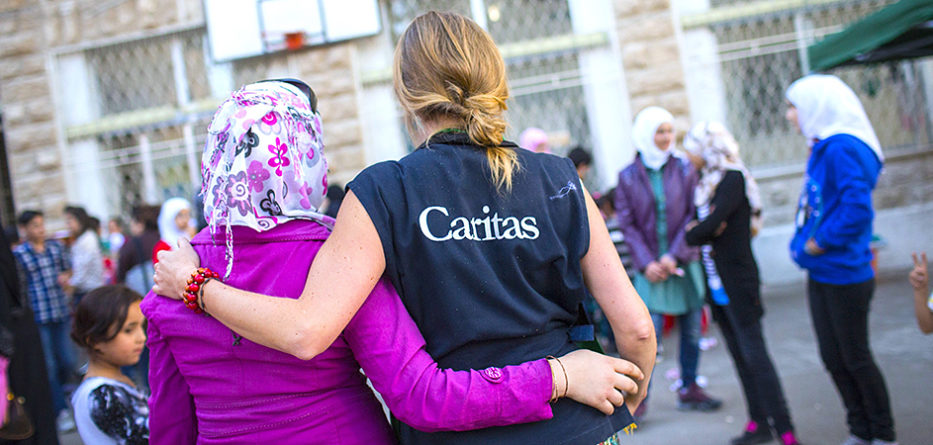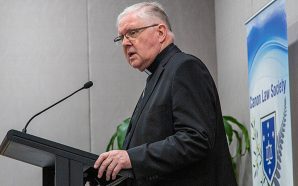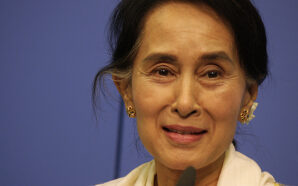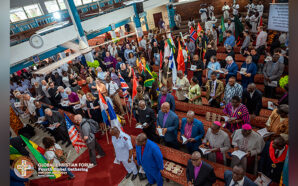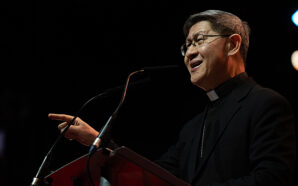107th World Day of Migrants and Refugees
TOWARDS AN EVER WIDER “WE”
26th Sunday in Ordinary Time
Readings: Numbers 11:25-29; James 5:1-6; Mark 9:38-43, 45, 47-48
Sunday 26 September 2021
One evening in late March last year, as the coronavirus pandemic took hold throughout our world, the Holy Father Francis stood in solitude in St Peter’s Square in Rome. The scene was poignant. Though the normally crowded square was empty, its colonnade reached out as if to embrace the peoples of our suffering world and unite us all in prayer.
RELATED: Prayers of the Faithful for World Day of Migrants and Refugees
In a profound way, the Holy Father embodied all humanity as he prayed with us and for us that evening; though solitary, he represented us all, embracing in his person every woman and man. Reflecting afterwards on his experience of that moment, Pope Francis recalled, “I was in contact with the people. There was no moment in which I was alone …”.
Eighteen months after that extraordinary moment of prayer in this time of pandemic, we are still struggling to control the spread of COVID-19 and we seem to be a long way finding a way out of its clutches, let alone a cure. Along with so much messaging in all sorts of media encouraging vaccination, mask-wearing, social distancing, and other safe practices, Ben Lee’s song ‘We’re all in this together’ has become a sort of anthem for these COVID-19 times.
The emphasis on our connection with each other, on the truth of ‘we’ that the pandemic has placed before us, stands in sharp contrast with the emphasis on the individual that has until now pervaded our times. Perhaps a grace of this time has been to remind us, to teach us anew, that each of us and all of us belong to a ‘we’ that is as wide as humanity.
This year, World Day of Migrants and Refugees urges us towards an ever wider ‘we’ in our attitude to the vast numbers of people who are at any one time traversing our world as migrants and refugees, towards an ever wider ‘we’ in our disposition to all people. It appears to be something of a human trait that we too often see differences that serve to exclude or divide rather than seeing what we share in common, which serves to include and unite.
Moses faces a situation of this kind in the first reading from the book of Numbers. Two men, Eldad and Medad, had not gone to the Tent of Meeting with Moses and seventy elders of the people. When the spirit came down on Eldad and Medad despite them not being enrolled with the seventy, they also began to prophesy. Some of the others took issue, but Moses responds by recognising that Eldad and Medad have received the same spirit as the seventy elders; he doesn’t accept the ‘us’ and ‘them’ distinction that is being put to him, but chooses a wider “we”, stating, “If only the whole people of the Lord were prophets, and the Lord gave his Spirit to them all.”
The first reading finds echoes in the gospel, where Mark recounts an exchange between Jesus and John. Some of the disciples of Jesus had seen a man who was not a disciple casting out devils in Jesus’ name and they tried to stop him. Jesus corrects this response by seeking to expand the disciples’ outlook to recognise that God’s activity is not restricted to them and nor may they claim exclusive rights to it. Here is Jesus, like Moses who prefigured him, teaching the disciples to recognise an ever wider “we”. Jesus isn’t suggesting that being his disciple doesn’t matter; his next words maker that clear: when anyone offers a disciple of Jesus something as simple as a cup of water to drink, it is being offered to Christ himself.
This will find a wider resonance near the end of Jesus’ ministry where, in Matthew’s gospel, “we” takes on its fullest meaning. There Jesus says to his disciples, “I was hungry and you gave me food; I was thirsty and you gave me drink; I was a stranger and you made me welcome; …”, and then explains to them that, “in so far as you did this to one of the least of these brothers [and sisters] of mine, you did it to me.” Not for me; but to me. The ever wider “we” towards which we are called on this World Day of Migrants and Refugees, is a “we” which impels us to see Christ in every migrant and refugee, in every person who is in need.
It is our failure to do so when we live self-centred lives that St James excoriates in the second reading. His words seem harsh and aren’t easy to hear. Directed to Christians who have lost their way and are living only for themselves, St James points out bluntly that living for self alone – living for “me” rather than for “we” – is harmful personally and harmful to others. It is a way of living that stands in sharp contrast with Jesus, who has taught us and shown us the way of living God intended from the very beginning. And it applies to nations just as it applies to individuals, which is why Pope Francis has addressed his message for World Day of Migrants and Refugees this year, “first to the Catholic faithful and then to all the men and women of our world, to advance towards an ever wider “we”.”
When the men and women of nations feel under threat from forces that seem beyond their control = pandemic, climate change, global economy, terrorism – it is easy to see why they retreat into a stance that is closed and defensive, and which excludes others – a sort of nationalist version of the individualism that makes people self-centred. Yet Jesus has shown us another way; the only way. It is a way that leads us towards an ever wider “we” by helping us see our world and its peoples as God sees us all and loves us all. It is a way that empowers us reach out and, in the words spoken by Pope Francis in the empty St Peter’s Square all those months ago, “to create spaces where everyone can recognise that they are called, and to allow new forms of hospitality, fraternity and solidarity”.
Rev Stephen Hackett MSC is the General Secretary for the Australian Catholic Bishops Conference.
This reflection features in the Resource Kit for the 107th World Day of Migrants and Refugees from the Australian Catholic Migrant and Refugee Office.




